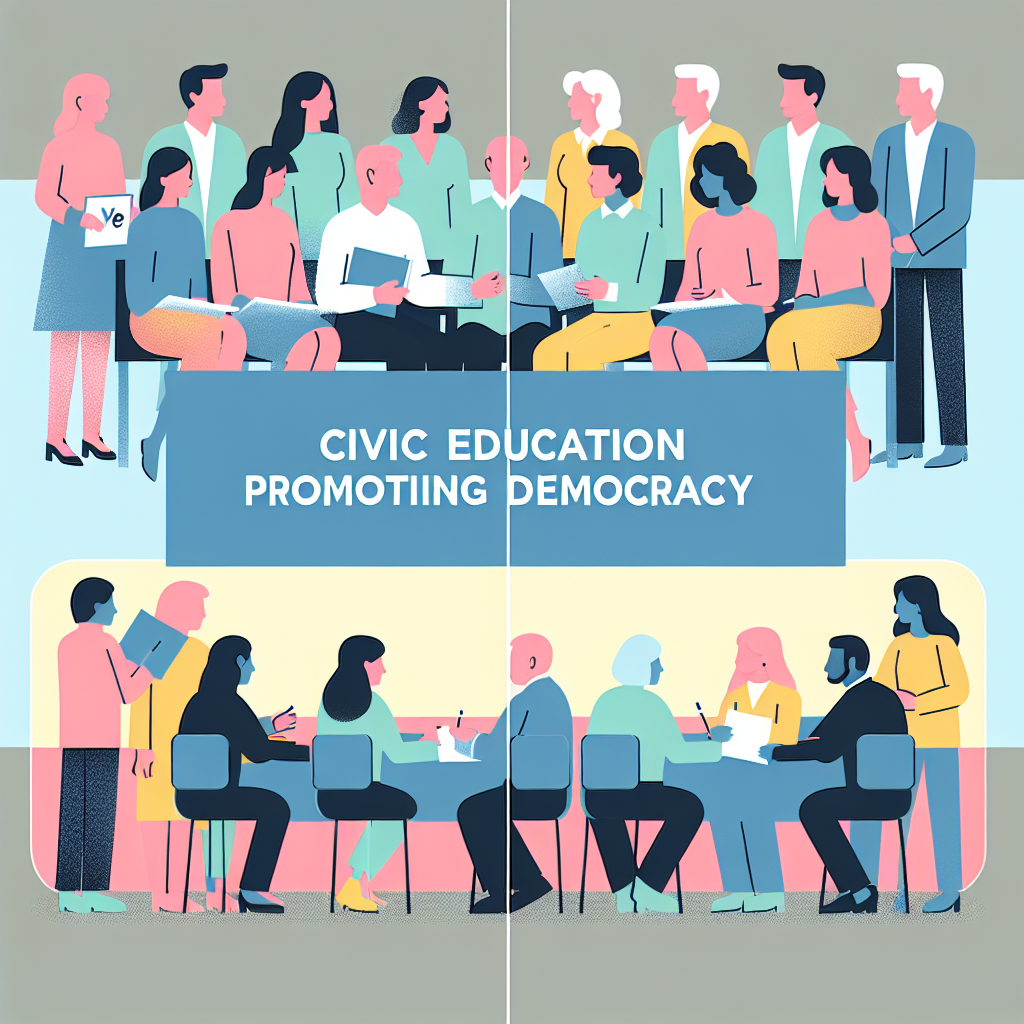
Introduction
Civic education plays an indispensable role in shaping informed citizens who can engage in the democratic process. As we navigate the complexities of governance in 2025, understanding the significance of civic education in promoting democracy is more important than ever. It is not just about understanding one’s rights; it’s about fostering a culture of active participation, social responsibility, and critical thinking. This article delves deep into the multifaceted role of civic education in promoting democracy, exploring its importance, impact on society, and strategies for effective implementation.
The Importance of Civic Education in a Democracy
Civic education serves as the foundation upon which democratic societies are built. It equips citizens with the knowledge and skills necessary to understand their rights and responsibilities. In 2025, as misinformation and disinformation proliferate through social media, the need for civic literacy is more urgent than ever. An informed citizenry is better positioned to discern fact from fiction, participate in political discourse intelligently, and hold elected officials accountable. By incorporating lessons on history, government structures, and civil rights, civic education ensures that individuals grasp the complexities of democratic governance.
Moreover, civic education fosters a sense of belonging and responsibility within the community. It teaches individuals that they are not just passive recipients of information but active participants in the democratic process. This sense of agency encourages them to engage in activities such as voting, advocacy, and community service. In a diverse society like that of 2025, where multiculturalism is celebrated, civic education helps bridge gaps and promote inclusivity, ensuring that all voices are heard and valued.
Impact of Civic Education on Youth Engagement
One of the most significant impacts of civic education is its ability to engage youth in the democratic process. Young people today are more informed and active on social issues than previous generations, and this trend can be traced back to structured civic education. Modern curriculum frameworks focus on relevant issues such as climate change, social justice, and economic inequality, making the learning experience more relatable and impactful. By integrating discussions about contemporary issues into civic education, educators can inspire students to take an interest in their communities and the world around them.
The power of youth engagement is evident in the increasing youth turnout in elections. Educational initiatives that encourage young people to understand their voting power can lead to substantial shifts in election outcomes. Programs emphasizing the importance of local elections and their impact on everyday life can instill a sense of urgency and responsibility. As young individuals become active voters and advocates, they contribute to a more vibrant and representative democracy that reflects the diverse values and priorities of the population.
Strategies for Effective Civic Education
Implementing effective civic education requires a multifaceted approach. One key strategy is utilizing experiential learning methods, such as service-learning and community engagement projects. These methods allow students to apply what they learn in real-world contexts, fostering empathy and a deeper understanding of societal challenges. Schools can partner with local organizations to create projects that benefit the community while simultaneously teaching students about civic responsibilities and government functions.
Another effective strategy is the integration of technology in civic education. As digital natives, today’s youth can engage with interactive platforms that encourage discussion and collaboration. Online simulations, virtual town halls, and digital advocacy campaigns can enhance the traditional classroom experience. Furthermore, teaching digital literacy is crucial in helping students navigate today’s information landscape. By evaluating sources and understanding the nuances of online discourse, students can become more discerning consumers of information, better equipping them to participate in democratic discussions.
Lastly, fostering collaboration between schools, families, and communities can strengthen civic education efforts. When parents and community members are involved in the educational process, students can enjoy a more robust learning experience rooted in real-world relevance. Schools can host workshops and discussions that encourage family participation, ensuring that citizens of all ages are equipped with the knowledge and tools necessary to contribute to a democratic society.
The Challenges and Barriers to Civic Education
Despite its importance, civic education faces numerous challenges in implementation. One significant barrier is the lack of resources and trained educators dedicated to the subject. Many schools prioritize standardized test preparation over civic education, leading to a decrease in funding and support for these programs. Consequently, educators may feel ill-equipped to teach complex political issues effectively, resulting in a generic curriculum that fails to engage students.
Another challenge is the varying state standards for civic education across the United States. Inconsistencies in curriculum content can leave students with a fragmented understanding of democracy. As some states may focus on specific ideologies or historical figures, the broader principles of civic engagement and critical thinking may be neglected. This inequity can further exacerbate disparities in civic knowledge and participation among different demographic groups.
Additionally, the world of intense political polarization presents challenges to teaching civic education. Educators often grapple with how to approach sensitive topics without alienating students or imparting personal biases. Creating a safe space for open dialogue is essential, yet difficult, particularly in an increasingly polarized society. Teachers need training and resources to navigate these discussions, promoting a respectful exchange of ideas that encourages critical thinking rather than reinforcing divisions.
Future of Civic Education in a Modern Democracy
Looking ahead, the future of civic education is likely to evolve alongside societal changes and technological advancements. In 2025, there is a growing recognition of the need for civic education to address emerging global challenges such as climate change and technological upheaval. As awareness of these critical issues increases, educators must adapt their curricula to ensure students comprehend not only national governance but also the interconnectedness of global citizenship.
Furthermore, civic education must incorporate lessons about digital citizenship. As technology plays a central role in communication and information dissemination, understanding how to engage responsibly online is vital. Schools should teach students about the ethical considerations of sharing information, the importance of verifying sources, and the impact of their online behavior on society. With the rise of social media as a political tool, knowledgeable citizens can better navigate the digital landscape and contribute positively to democratic discourse.
Finally, grassroots movements advocating for stronger civic education programs at both local and national levels are likely to gain momentum. Communities recognizing the importance of fostering engaged citizens may push for reforms that prioritize comprehensive civic education in schools. As public demand for informed and responsible citizenship grows, policymakers will need to respond by allocating increased resources to civic education initiatives that empower all citizens to actively participate in democracy.
Conclusion
Civic education remains a cornerstone for promoting democracy in our increasingly complex world. It empowers individuals to engage meaningfully in the democratic process, fosters community responsibility, and shapes informed citizens capable of navigating contemporary challenges. While there are barriers to the effective implementation of civic education, innovative strategies and grassroots movements offer hope for the future. By investing in civic education now, we can cultivate a more engaged and informed populace, ensuring democracy thrives for generations to come.
FAQs
What is civic education?
Civic education refers to the teaching and learning process that equips citizens with knowledge about their rights, responsibilities, and the workings of government. It aims to foster informed and engaged citizens capable of participating meaningfully in democracy.
How does civic education promote active citizenship?
Civic education promotes active citizenship by encouraging individuals to understand their rights and responsibilities, recognize the importance of participation in democratic processes, and engage in community service and advocacy efforts.
What are some effective strategies for teaching civic education?
Effective strategies for teaching civic education include experiential learning through community engagement projects, the integration of technology for interactive learning, and fostering collaboration between schools, families, and local communities.
What challenges does civic education face in schools today?
Civic education faces challenges such as a lack of resources and trained educators, inconsistent state standards, and the difficulty of addressing sensitive political topics in an increasingly polarized environment.
Why is civic education important for youth?
Civic education is crucial for youth as it fosters engagement, critical thinking, and a sense of responsibility, empowering young citizens to participate actively in shaping their communities and the democratic process.
Democracy versus Autocracy: A Global Perspective
16. Dezember 2025The Impact of Sanctions on Global Trade Dynamics
16. Dezember 2025Geopolitical Tensions in the South China Sea
16. Dezember 2025
Leave a reply Antwort abbrechen
-
How Advanced Stats are Changing the Game
16. Juli 2025 -
Harnessing Visualization Techniques for Sports Excellence
16. Dezember 2025 -
Behind the Scenes: The Preparation Leading to Championship Results.
14. Dezember 2025





